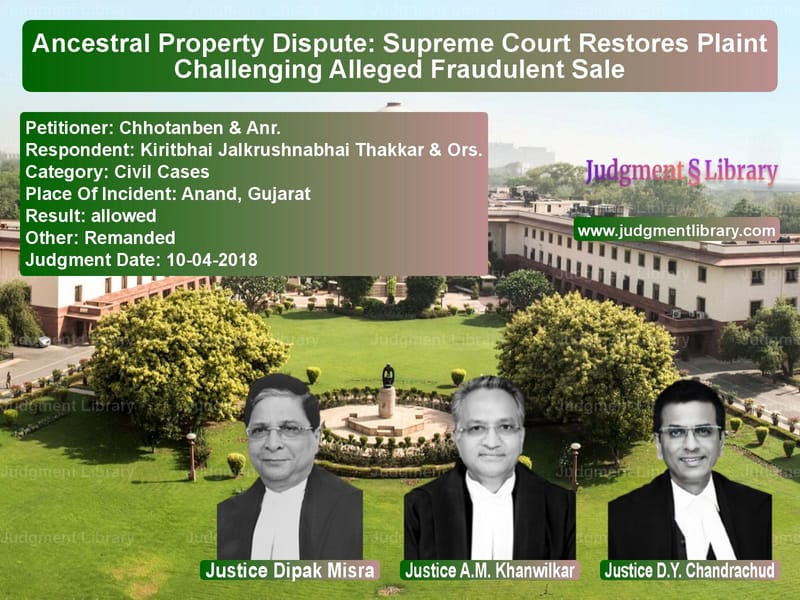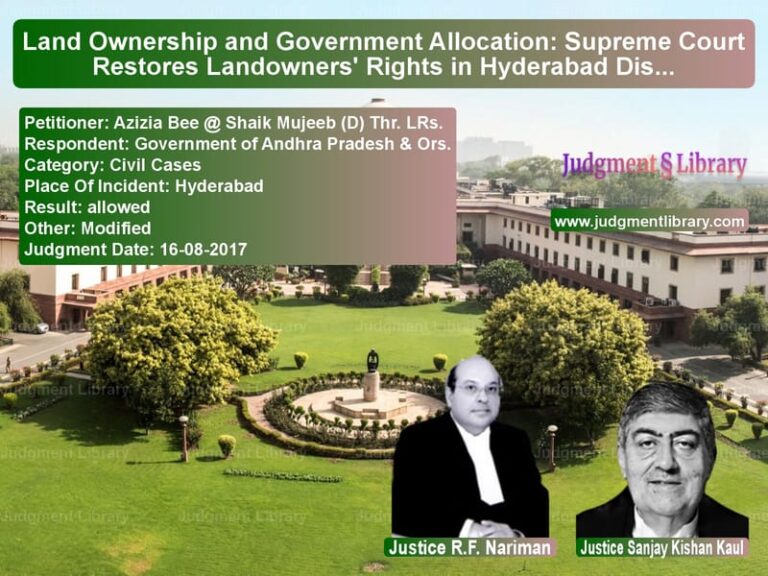Ancestral Property Dispute: Supreme Court Restores Plaint Challenging Alleged Fraudulent Sale
Property disputes involving ancestral land and inheritance rights often lead to prolonged legal battles, especially when one party claims fraudulent transactions. The case of Chhotanben & Anr. vs. Kiritbhai Jalkrushnabhai Thakkar & Ors. revolved around the claim that the plaintiffs’ ancestral property was fraudulently sold without their knowledge. The Supreme Court, in its judgment dated April 10, 2018, ruled in favor of the appellants, setting aside the Gujarat High Court’s order that had dismissed their suit on grounds of limitation.
This ruling is significant as it reinforces the principle that courts must consider whether a suit is barred by limitation only after evaluating the full factual matrix rather than dismissing it at the outset.
Background of the Case
The dispute involved agricultural land in Hadgud, Anand District, Gujarat, inherited by the appellants (plaintiffs) and their brothers (original defendant nos. 1 and 2) from their deceased father, Bawamiya Kamaluddin Saiyed. The land was recorded as jointly owned and undivided in the revenue records.
The appellants alleged that without their knowledge, their brothers executed a registered sale deed on October 18, 1996, transferring the land to the respondents. The appellants claimed that they only discovered this fraudulent transaction in 2013 after being informed by their community members. They immediately sought certified copies of the sale deed and, upon review, noticed that their thumb impressions were falsely obtained.
Upon realizing the alleged fraud, the appellants filed Regular Civil Suit No. 166 of 2015 (formerly Special Civil Suit No. 193 of 2013) before the Principal Senior Civil Court, Anand, seeking:
- A declaration that the property was ancestral and jointly owned.
- Partition of the land and exclusive possession of their rightful share.
- Cancellation of the registered sale deed dated October 18, 1996.
- A permanent injunction restraining the defendants from interfering with their possession.
Legal Proceedings
Trial Court Decision: The defendants challenged the maintainability of the suit, arguing that it was barred by limitation since it was filed 17 years after the sale transaction. However, the trial court, in its order dated January 20, 2016, dismissed this contention, holding that limitation was a triable issue requiring evidence.
High Court Decision: The respondents appealed to the Gujarat High Court through Civil Revision Application No. 76 of 2016. The High Court reversed the trial court’s order, ruling that the suit was barred by limitation. It observed that:
- The plaintiffs were witnesses to the sale deed and could not claim ignorance.
- Revenue records had been updated since 1997, and no objections were raised.
- The suit was filed only in 2013, indicating an undue delay.
The appellants then approached the Supreme Court.
Key Legal Issues
The Supreme Court examined the following issues:
- Whether the High Court erred in rejecting the suit at the preliminary stage.
- Whether the plaintiffs had no knowledge of the sale deed until 2013, making the suit timely under the Limitation Act.
- Whether the plaintiffs’ thumb impressions on the sale deed were obtained fraudulently.
Arguments by Both Parties
Petitioner’s Argument (Chhotanben & Anr.):
- The sale was executed fraudulently, and the plaintiffs had no knowledge of it until 2013.
- The suit was filed within time after discovering the fraud.
- The High Court failed to appreciate that limitation is a mixed question of law and fact, which can only be decided after examining evidence.
Respondent’s Argument (Kiritbhai Jalkrushnabhai Thakkar & Ors.):
- The plaintiffs were aware of the transaction, as their thumb impressions appeared on the sale deed.
- The revenue records were changed in 1997, and no objections were raised for 17 years.
- The delay in filing the suit indicated it was an afterthought.
Supreme Court’s Observations
The Supreme Court, comprising Chief Justice Dipak Misra, Justice A.M. Khanwilkar, and Justice Dr. D.Y. Chandrachud, ruled in favor of the appellants, emphasizing that the High Court had committed a manifest error in rejecting the suit at the preliminary stage.
Key Excerpt from the Supreme Court Judgment:
“The plaintiffs have asserted that they had no knowledge of the sale deed until 2013. The question of limitation is, therefore, a triable issue requiring evidence. The High Court erred in summarily rejecting the suit.”
The Court further clarified:
“At the stage of deciding an application under Order VII Rule 11(d), the court must only consider the averments in the plaint. The pleas raised by the defendants cannot be a ground to reject the plaint.”
Final Verdict
The Supreme Court ruled:
- The Gujarat High Court’s order dismissing the suit was set aside.
- The suit was restored before the trial court.
- The trial court was directed to proceed with the case on merits.
- No costs were imposed.
Impact of the Judgment
This ruling has significant implications for property disputes involving alleged fraud:
- It reinforces that limitation must be assessed based on evidence rather than assumptions.
- It ensures that plaintiffs are given a fair opportunity to prove fraud claims.
- It clarifies that courts should not reject suits at the preliminary stage unless the bar of limitation is absolutely clear.
Conclusion
This judgment strengthens legal protections for individuals alleging fraudulent transactions. The Supreme Court has reaffirmed that limitation is a fact-based determination that requires evidence rather than summary dismissal. By restoring the plaintiffs’ suit, the Court has ensured a fair trial process in property disputes.
Petitioner Name: Chhotanben & Anr..Respondent Name: Kiritbhai Jalkrushnabhai Thakkar & Ors..Judgment By: Justice Dipak Misra, Justice A.M. Khanwilkar, Justice D.Y. Chandrachud.Place Of Incident: Anand, Gujarat.Judgment Date: 10-04-2018.
Don’t miss out on the full details! Download the complete judgment in PDF format below and gain valuable insights instantly!
Download Judgment: Chhotanben & Anr. vs Kiritbhai Jalkrushna Supreme Court of India Judgment Dated 10-04-2018.pdf
Direct Downlaod Judgment: Direct downlaod this Judgment
See all petitions in Property Disputes
See all petitions in Succession and Wills
See all petitions in Landlord-Tenant Disputes
See all petitions in Judgment by Dipak Misra
See all petitions in Judgment by A M Khanwilkar
See all petitions in Judgment by Dhananjaya Y Chandrachud
See all petitions in allowed
See all petitions in Remanded
See all petitions in supreme court of India judgments April 2018
See all petitions in 2018 judgments
See all posts in Civil Cases Category
See all allowed petitions in Civil Cases Category
See all Dismissed petitions in Civil Cases Category
See all partially allowed petitions in Civil Cases Category







